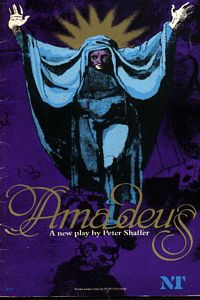AMADEUS
by Peter Schaffer
Venue: National Theatre (Olivier) 1980
Director: Peter Hall
Venue: National Theatre (Olivier) 1980
Director: Peter Hall

Cast
| The "Venticelli" | Dermot Crowley Donald Gee |
| Ignaz Greybig Valet to Salieri |
Philip Locke |
| Antonio Salieri | Paul Scofield |
| Johann Kilian von Strack Groom of the Imperial Chamber |
Basil Henson |
| Count Orsini-Rosenberg Director of the Imperial Opera |
Andrew Cruickshank |
| Baron van Swieten Prefect of the Imperial Library |
Nicholas Selby |
| Constanze Weber | Felicity Kendal |
| Wolfgang Amadeus Mozart | Simon Callow |
| Major Domo | William Sleigh |
| Joseph II Emperor of Austria |
John Normington |
| Servants | Nik Forster David Morris Adam Norton Steven Slater |
| Citizens of Vienna | Glyn Baker Nigel Bellairs Terry Diab Leo Dove Jane Evers Sandra Fehr Robin McDonald Peggy Marshall Robin Meredith Glenn Williams |
Review
Let no one accuse Peter Shaffer of being over-prolific. In 21 years he has written just eight plays, the last being Equus in 1973. But what he lacks in quantity he makes up for with immaculate craftsmanship and a wonderful flair for theatrical effect, both of which are in admirable evidence in Amadeus at the Olivier.
This is a musical mystery story about two or Vienna's most notable 18th century figures - Mozart, the youthful prodigy, arrogant, undiplomatic, childish and phenomenally gifted, and Salieri, the Italian-born court composer, not much older than Mozart but puritanical where the younger man was morally lax, musically traditional where Mozart was adventurous. In one sense it is a study of the power of the arts establishment, with Salieri holding all the aces, which enabled him to rationalise his jealousy and prevent Mozart from reaching the position to which his talent entitled him.
In another sense, however, it is a fascinating tale of human frailty, which suggests that Salieri, a most upright and dignified figure, actually murdered Mozart by administering gradual doses of poison after the young genius had become weakened by continual rejection. The play itself takes the form or two long flashbacks resulting from Salieri's confession and projected suicide, which we are shown him as bungling.
For all its episodic construction Amadeus does come across as a most impressive piece of work, directed by Peter Hall and designed by John Bury with a full appreciation of the Olivier's capabilities. The characterisation is outstanding, from the two chattering informants (Dermot Crowley and Donald Gee) through Felicity Kendal's bird-like vulnerability as Mozart's wife, the performances by Basil Henson, Andrew Cruickshank and Nicholas Selby as the sycophantic functionaries, Philip Locke's evilly narrow-minded servant and John Normington's elegant but none-too-bright Emperor, up to the two towering portrayals of Salieri and Mozart.
As Salieri Paul Scofield gives his most accomplished performance for several seasons, switching abruptly from senility to middle age and back again and presenting us with a rounded portrait of somebody whose insecurity has turned him into a cunning schemer. But Simon Callow, surely one of the most brilliant young actors of the present day, steals the honours with his riveting portrayal or Mozart, a young man of arrested mental and emotional development which leads him to outrage the sensibilities of everyone who comes into contact with him. Seldom can the other side of genius have been shown with such startling economy.